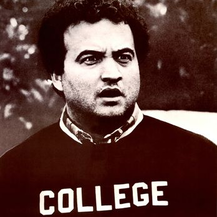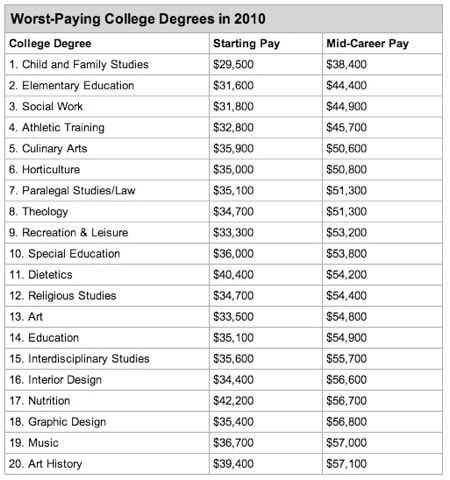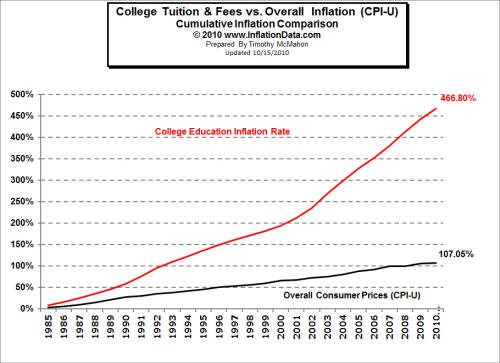|
So here is the final piece I wrote in my series on economic lies, damned lies and statistics for SwiftEconomics (which I turned into a book, by the way). I also wrote an updated piece on it for The Mises Institute. Enjoy! ______________________________________________________________________________________________________ Previous in Lies, Damned Lies and Statistics Series: Part 9: The BMI ______________________________________________________________________________________________________ The surest way to the good life is a college degree, right? Hey, both my colleague Ryan Swift and I have one. As Hillary Clinton said, “Graduates from four-year colleges earn nearly an estimated one million dollars more [than high school graduates].” Oh so true Madame Hillary, and oh so irrelevant. After all, isn’t it true that the most hard-working and intelligent people usually go to college? I’m not making a nature/nurture argument here, the factors behinds these qualities are irreverent to the discussion at hand. If one grants, however, that the more ambitious and talented go to college in great proportions than their peers, couldn’t we just say that people that are the most hard-working and intelligent make “an estimated one million dollars more.” Whoop-de-friggin’-doo. Furthermore, as John Stossel notes, that “one million dollars more” includes super earners such as CEO’s which skew the average upward (although some, such as Mark Zuckerberg and Bill Gates didn’t graduate college). This is why it’s better to use the median (the middle number in the data set) than the mean or average. It’s also why Hillary Clinton and other repeaters of this factoid don’t. When one thinks about this honestly, it truly becomes absurd. Indeed, who exactly are we comparing? We’d not only be comparing Jane-Lawyer to Joe-Carpenter, but we’d also be comparing financial analysts with the mentally disabled, medical doctors with welfare dependents, building engineers with drug addicts, architects with pan handlers, marketing directors with immigrants who can barely speak English and university professors with career criminals (whose earnings, by the way, are rarely reported). Many of these troubled people didn’t graduate high school, but you’d be shocked how they shuffle people through the system these days. And something tells me that these particular non-graduates need something other than four years of drinking and studying Lockean (OK, more likely Marxian) philosophy. When we control for the type of people entering college things change. As I pointed out in my article about the female-male college gap, if we take the average earnings of a high school graduate and college graduate, account for cost of college and the opportunity cost of going to college (time not spent earning money) and assume a 5% savings rate for each, the college grad has a net worth of $400,000 when he retires. The high school grad: $1.3 million. Revenge of the jocks. It certainly could be good to earn a college degree. If you want to be an accountant, engineer or doctor you need one for sure. And those jobs have very high incomes. But do you really expect to make a killing with a degree in sociology or Medieval-African-Women’s-Military-Ethnic Studies? Pretty much the only jobs those degrees help one get, in any other way than the “hey, they got a college degree,” are jobs teaching sociology or Medieval-African-Women’s-Military-Ethnic Studies. And that requires an Advanced degree as well, i.e. more money down the tube. Look at this chart showing the lowest average salaries based upon particular college degrees (which by the way, the proponents of college never differentiate between): OK, not horrible. But think of what an industrious young person could do without a college degree. One possibility would be entrepreneurship. I have at least two friends who dropped out of college and are now millionaire entrepreneurs. Both of them are under 30 years old. Another possibility are apprenticeship programs. The average electrician makes $22.32/hr and the average plumber makes $21.94/hr. Multiply that by 40 hours a week and 50 weeks a year (two weeks vacation) and you have average salaries of $44,640 and $43,880 a year. While those are near the bottom of the pack in the above list, it comes without the debt and lost years of college (apprentices are usually paid). And while it’s true that plumbers have to work with poo, there are many other jobs and career routes that involve neither college nor poo. Furthermore, not everyone is cut out for college (through either nature or nurture) and trying to hack it (or not caring and simply drinking your way through it) can have serious financial consequences. As James E. Rosenbaum points out: Seventy-one percent of the class of 1982 planned to get a college degree. Ten years later, 63.9 percent of those with A averages had attained an A.A. degree or higher, but only 13.9% of those with C average (or lower) had done so. Yes, some people simply don’t belong in college, I’m sorry. And these same people will do better if they’re not wasting their time and money slogging through an alcohol-drenched, college curriculum they can’t or don’t want to keep up with while accumulating large sums of debt to boot. But the “college for everyone” proponents don’t see it that way, Rosenbaum again: Indeed, 57 percent of seniors in the bottom half of the academic rankings reported that counselors urged them to attend college. Again, this wouldn’t be so bad if there weren’t any downsides to going to college, but there are. Tuition rates are going up at about four times the rate of inflation: Furthermore, as The Chronicle reports, student loan default rates are much higher than usually reported: …one in every five government loans that entered repayment in 1995 has gone into default. The default rate is higher for loans made to students from two-year colleges, and higher still, reaching 40 percent, for those who attended for-profit institutions. Indeed, some think that student loans is the next big financial bubble. It should also be noted that a large percentage of students don’t even graduate from college. According to US News many don’t: Studies have shown that nonselective colleges graduate, on average, 35 percent of their students, while the most competitive schools graduate 88 percent. Harvard’s 97 percent four-year graduation rate might not be that surprising… [but then] Texas Southern University’s rate was 12 percent. 12% is simply ridiculous, but the 35% for nonselective schools is extremely bad, too. Even the 88% for competitive schools leaves 12% of their students with no degree, but plenty of debt.
College is good for some people. If you go into a field that has high earning potential (engineering, medicine, accounting, etc.) or you really like a certain subject and want to dedicate your life to that even if it may not make financial sense, go for it. But don’t go to college, because, as Colin Hanks says in Orange County, “that’s what you do after high school!” No Colin, that’s what the educational establishment wants you to do after high school and a few bogus statistics here and there doesn’t make it a good decision. Photo Credit: Fintrend, Michael Priceless and Trucker Deluxe ______________________________________________________________________________________________________ Lies, Damned Lies and Statistics Series Part 1: A Primer Part 2: Income Stagnation Part 3: All Fiat Currencies Fail Part 4: Iraq War Casualties Part 5: Female-Male College Gap Part 6: Male-Female Wage Gap Part 7: Roger Maris’ Asterisk Part 8: Women Do All the Work but Men Keep All the Money Part 9: The BMI Part 10: A College Degree is Worth One Million Dollars
Comments
|
Andrew Syrios"Every day is a new life to the wise man." Archives
August 2018
Blog Roll
Bigger Pockets REI Club Tim Ferris Joe Rogan Adam Carolla MAREI Worcester Investments Entrepreneur The Righteous Mind Star Slate Codex Mises Institute Tom Woods Consulting by RPM Swift Economics Categories |



 RSS Feed
RSS Feed


